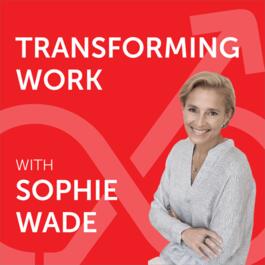
Oscar Trimboli — Deep Listening for Enhanced Communication and Effective Meetings
Oscar Trimboli is a marketing and technology industry veteran who consults to multinationals with a quest to create 100 million Deep Listeners. Over 28,000 people have contributed to his research about listening. Oscar describes how he learned to listen deeply and consequently improve organizational performance including shortening meetings. He shares useful insights and questioning techniques, demonstrated as he prompts Sophie to hone her own skills. Oscar is the author of “How to Listen”, and host of award-winning podcast “Deep Listening.” KEY TAKEAWAYS [03:01] To avoid drawing attention to himself, Oscar starts to ask people questions and be very curious. [04:10] Oscar learned to watch and listen for signs playing cards with international students at school. [06:58] Following his father’s advice, Oscar becomes an accountant, but his boss steers him to coding. [09:17] “Which customers have you listened to?” Oscar asks engineers when developing new products. [11:40] If people want to join Oscar’s team they are tasked to bring back a new insight about customers. [14:11] Before becoming CEO, Satya Nadella was in a Microsoft division which was customer-focused. [14:54] A concerning interaction with Oscar’s VP ends up with him being asked to code how to listen. [16:45] Oscar audits a meeting starting to encode his observations and build his research database—now at 27,000--and listening materials. [18:29] Researching non-therapeutic listening, Oscar discovers no commonality of approach. [19:13] Observing interactions, Oscar starts counting the number of questions, types, and length. [20:37] Good meeting hosts have empathetic curiosity to understand other people’s perspectives. [22:48] Deliberate listening and questioning techniques can shorten meetings by several hours a week. [23:55] Assessing appropriate use of open-ended questions and biased questions. [26:00] Oscar believes many leaders operate from a place of unconscious bias vs dialogue and outcome. [26:55] Oscar notes that Sophie’s question is long and complex and advises her to break it down to improve understanding. [28:44] Oscar answers Sophie’s reworded question, explaining the five levels of listening. [30:10] People only voice 14% of their thoughts, so the most important elements may be left unsaid. [32:02] The importance of silence—appreciated more in indigenous cultures and Asian countries. [33:45] The Bias Assessment: Oscar says 3 is half of 8 and shows he is correct! [35:16] Using the Harvard Association Bias Assessment to help combat our assumption filter. [37:40] Interrupting skillfully and elegantly—but not cutting someone off—can be a powerful listening technique. [39:19] The question to ask at the beginning of a conversation to create common direction and shorten the meeting. [43:15] How referring periodically to the question acts as a compass and tracks progress. [44:08] How this listening compass gives permission for adjustments and shortens meetings. [45:14] Oscar wonders if Sophie could shorten her question to one sentence. [46:01] Sophie’s second question is short and direct, possibly too direct? [47:03] Oscar shares the 1:25:900 rule, Sophie incorporates context, revising the question a third time. [48:34] How leaders can hone their question skills, recognizing different orientation and perspectives. [51:57] We have a listening battery with finite capacity. Ensure you recharge it or postpone the next meeting. [53:29] The importance of carving out time between and before virtual meetings. [55:05] IMMEDIATE ACTION TIP: Before you go into a virtual meeting, use three minutes to charge your listening battery by listening to music. The music tempo should match the outcome you want. At the same time, get out of your chair, go for a walk. RESOURCES Oscar Trimboli on LinkedIn Oscar’s website Oscar’s book “How to Listen: Discover the Hidden Key to Better Communication” To explore your listening barriers www.listeningquiz.com QUOTES (edited) “Which customers have you listened to to form your opinion?” “When you are the speaker, quite often what you say and what the listener hears is at the intersection of what's going through their mind. What you said and what you say may not be heard by them because they're processing this in a completely different way.” “A good host will get everybody to listen to them. A great host will get everybody to listen to each other.” “It's about empathetic curiosity to go “Can I seek to understand their perspective just a little longer?” because when I do, I may see horizons, I may see opportunities, I may see perspectives that I've never envisaged before and this only happens when you explore through questions.” “If you ask questions with more than eight words, typically it is going to be a biased question. If you ask questions with less than eight words, typically it is going to be more open-ended.” “So the five levels of listening: first is listen to yourself, next, listen to the content, what they say, what you sense, and what you hear.” “So typically someone will speak in a range of 125 to 150 words per minute, but they can think nearly nine times faster. They can think of 900 words per minute. So the very first things they say is 14% of what they think and what they mean. So it means that most conversations have 86% of the conversation not said.” “In high context cultures….silence is a sign of wisdom, respect, and authority. Silence is a magnet that draws out what's missing in the conversation.” “If we're conscious of silence, we can draw out more of what's unsaid, because silence is that great universal cross cultural magnet that helps all of us listen.” “What would make this a great conversation?” “Hanging on every word doesn't make a good listening. Interrupting skillfully, professionally elegantly can be as powerful a listening technique. Most people confuse listening with therapy, where you have to be silent the whole time.” “Managers get results when they're present. Leaders get results when they're absent.”
From "Transforming Work with Sophie Wade"




Comments
Add comment Feedback